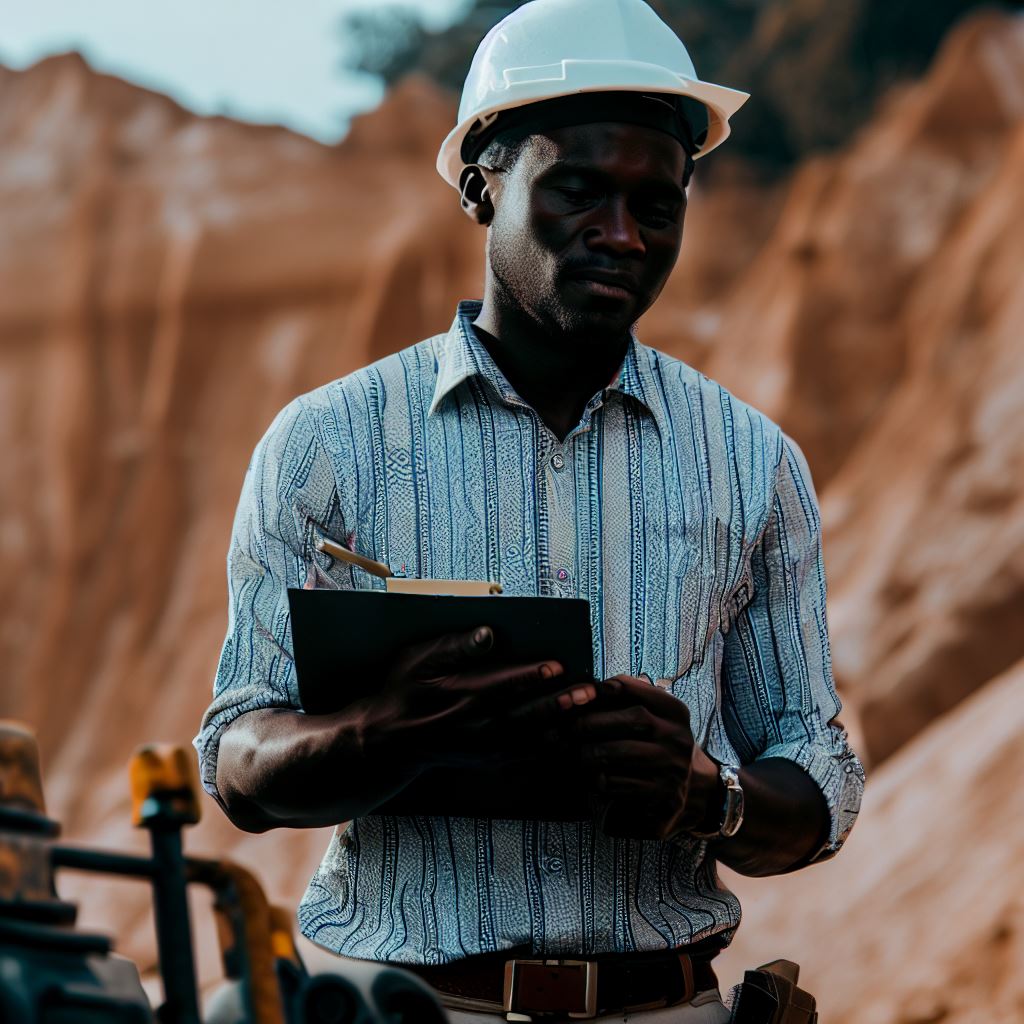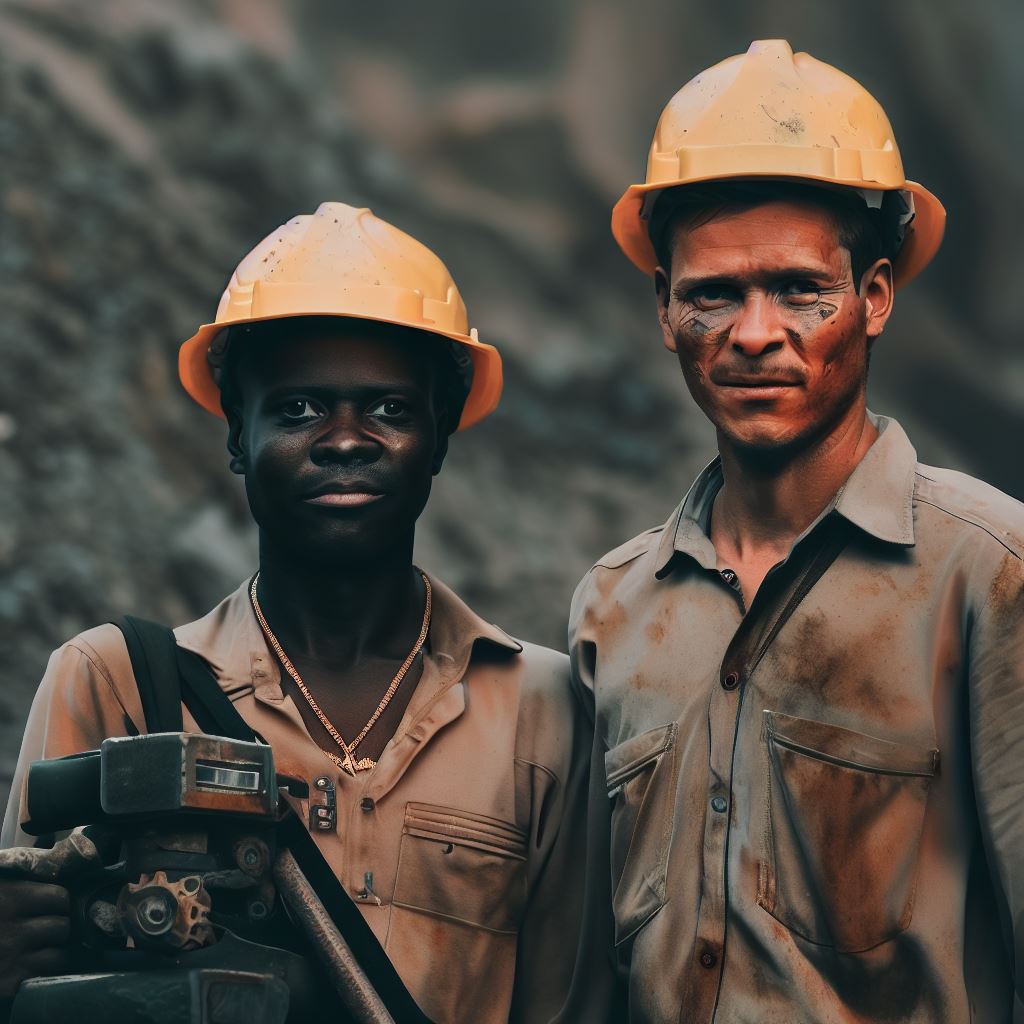Introduction
Geology plays a crucial role in Nigeria, as it contributes to various sectors such as oil and gas, mining, agriculture, and infrastructure development.
The purpose of this blog post is to discuss the challenges faced by geologists working in Nigeria today and raise awareness about their importance in the country’s development.
Read: Nigeria’s Contribution to Climate Science Research
Background on Geology in Nigeria
The geological features and resources in Nigeria
- Nigeria is rich in various geological features, including sedimentary basins, ancient crystalline rocks, and volcanic formations.
- It is blessed with abundant natural resources such as oil, natural gas, coal, limestone, tin, and niobium.
- The country has a diverse range of geological formations, including the Niger Delta, Jos Plateau, and the Benue Trough.
- There are also numerous mineral deposits, such as gold, iron ore, copper, gypsum, and barite, found across the country.
- Nigeria’s geology has contributed significantly to the country’s economic development and growth.
Importance of geology in sectors such as oil and gas, mining, and infrastructure development
- The oil and gas sector is crucial to Nigeria’s economy, accounting for a significant portion of its GDP.
- Geological studies play a vital role in the exploration and production of oil and gas reserves in Nigeria.
- Geologists apply their expertise to identify potential oil and gas reservoirs, analyze data, and support drilling operations.
- Mining is another sector where geology is of utmost importance in Nigeria.
- Geologists help identify mineral deposits, assess their economic viability, and provide guidance for sustainable mining operations.
- Infrastructure development, including road construction, building projects, and dams, relies on geological surveys and assessments.
- Geologists provide critical information about soil composition, geological hazards, and groundwater resources to ensure safe and durable infrastructure.
- Efficient utilization of Nigeria’s geological resources can drive economic growth, create jobs, and improve living standards.
Geologists and geotechnical experts are essential contributors to the success and sustainability of these industries.
Read: International Collaborations: Nigeria’s Science Community
Challenges Faced by Geologists in Nigeria
Limited funding for research and exploration activities
Geologists working in Nigeria face various challenges that hinder their research and exploration activities. One major obstacle is the limited funding available for such projects.
The government does not provide sufficient support or investment in geology-related endeavors, leading to a lack of financial resources.
Due to the inadequate budget allocation for geological surveys and studies, geologists often struggle to conduct thorough research and obtain accurate data.
This limitation significantly hampers their ability to make informed decisions and contribute to the growth of the field.
Inadequate infrastructure and equipment
In addition to funding issues, geologists in Nigeria also grapple with inadequate infrastructure and equipment.
The absence of modern laboratory facilities for analysis and testing severely impedes the progress of their work.
Geologists are unable to conduct advanced experiments and analyses, reducing the accuracy and reliability of their findings.
Limited job opportunities and career growth
Furthermore, geologists in Nigeria encounter limited job opportunities and career growth prospects.
The high competition for geology positions within the industry makes it challenging to secure stable employment.
Additionally, the scarcity of opportunities for professional development and training hinders their ability to enhance their skills and advance their careers.
Security concerns and fieldwork challenges
Security concerns and fieldwork challenges pose significant obstacles for geologists in Nigeria as well.
In remote or conflict-prone areas, insufficient security measures put their safety at risk.
Moreover, navigating challenging terrains proves to be difficult, impeding their ability to conduct fieldwork and gather essential data.
Environmental and sustainability issues
Environmental and sustainability issues further contribute to the challenges faced by geologists in Nigeria.
The lack of environmental impact assessments in geological projects raises concerns about the long-term effects of these activities.
Geologists advocate for sustainable practices in mining and extraction activities to minimize harm to the environment and promote responsible resource management.
Geologists in Nigeria confront numerous challenges that impede their work and hinder the progress of the field.
Limited funding, inadequate infrastructure, and equipment, as well as limited job opportunities and career growth, pose significant obstacles.
Security concerns, fieldwork challenges, and environmental issues further compound these difficulties.
Addressing these challenges is crucial to advancing geological research and exploration in Nigeria and ensuring a sustainable and prosperous future for the field.
Read: Biochemistry Internships in Nigeria: A Guide

Efforts to Overcome the Challenges
Advocacy and lobbying for increased funding and government support
The geology sector in Nigeria faces numerous challenges, from lack of funding to inadequate government support.
To overcome these challenges, geologists have been actively advocating and lobbying for increased funding and support from the government.
They have been engaging with policymakers and presenting the importance of geology in various sectors such as oil and gas, mining, and environmental management.
By highlighting the potential economic and environmental benefits of investing in geology, geologists aim to secure more funding and resources for their work.
Collaborations between geology associations, educational institutions, and industry players
Collaborations between different stakeholders play a significant role in overcoming the challenges faced by geologists in Nigeria.
Geology associations, educational institutions, and industry players have been forming partnerships and working together towards common goals.
These collaborations involve sharing knowledge and expertise, conducting joint research projects, and organizing workshops and conferences.
By working together, geologists can leverage each other’s strengths and resources, leading to more effective and impactful outcomes.
Introduction of training programs and capacity-building initiatives
To address the skill gaps and deficiencies in the geology workforce in Nigeria, the introduction of training programs and capacity-building initiatives has been prioritized.
These programs are designed to enhance the technical skills and knowledge of geologists, keeping them up to date with the latest advancements in the field.
They also focus on improving the practical skills required for geologists to carry out their work effectively.
The training programs and capacity-building initiatives are often organized by geology associations, educational institutions, and industry players.
They provide geologists with opportunities to learn and grow, ultimately contributing to the development of the geology sector in Nigeria.
Promotion of sustainable practices in the geology sector
The geology sector in Nigeria, like any other industry, needs to adopt sustainable practices to ensure the long-term viability of its operations.
Geologists are actively promoting and advocating for sustainable practices in various aspects of their work, such as resource extraction, environmental impact assessments, and land use planning.
They are working towards minimizing the negative environmental and social impacts associated with geology activities while maximizing the benefits.
By integrating sustainability principles into their work, geologists can create a more sustainable and responsible geology sector in Nigeria.
Geologists working in Nigeria today face several challenges, including insufficient funding, inadequate government support, and skill gaps.
Efforts to overcome these challenges include advocating for increased funding, fostering collaborations among stakeholders, introducing training programs, and promoting sustainable practices.
With continued focus on these efforts, the geology sector in Nigeria can thrive and contribute to the country’s development.
Read: Freelancing as a Data Analyst in Nigeria: Guide
Conclusion
The challenges faced by geologists in Nigeria
Geologists working in Nigeria today face numerous challenges that hinder their ability to carry out their work effectively.
These challenges include inadequate funding for research and exploration, limited access to modern technology and equipment, inadequate infrastructure, and security concerns in certain regions.
Despite these obstacles, geologists in Nigeria remain resilient and continue to contribute to the nation’s economy and development.
Optimistic outlook on the future of geology in Nigeria
There is hope for the future of geology in Nigeria. The country has vast untapped mineral resources and potential for economic growth through the exploration and exploitation of these resources.
Increased investment, improved infrastructure, and capacity building empower Nigerian geologists to drive sustainable development and create job opportunities.
The geology industry has the potential to contribute to GDP growth and reduce the nation’s dependence on oil revenue.
Call to action to address the challenges and support the geology industry in Nigeria
To overcome the challenges faced by geologists in Nigeria, there needs to be a collective effort from the government, private sector, and relevant stakeholders.
Adequate funding for research, exploration, and capacity building programs should be allocated.
The government should invest in infrastructure development to improve access to remote areas and support the geology industry.
Partnerships between academia, industry, and government organizations should be fostered to promote knowledge sharing and innovation.
Supportive policies and regulations should be implemented to encourage responsible exploration and development of mineral resources.
By addressing these challenges and supporting the geology industry, Nigeria can unlock its geological potential and achieve sustainable economic growth.




